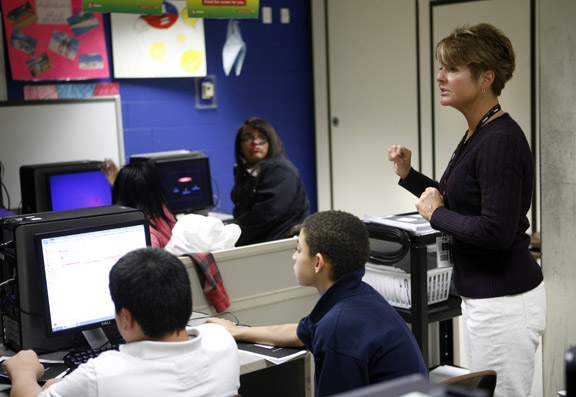
Julie Cheuvront gives her 8th-grade practical living/vocational studies class directions for the Missing game as part of the Web Wise Kids internet safety program at Lexington Traditional Magnet Middle School (Fayette County) Nov. 17, 2010. Photo by Amy Wallot
By Matthew Tungate
matthew.tungate@education.ky.gov
Zack, a Canadian teenager, used his computer to escape his troubled family life. He formed an online friendship with an online magazine developer named Fantasma, who was soon helping Zack design his own online comic. Zack ultimately ran away to work for Fantasma in California, only to find out Fantasma was a predator engaged in illegal activities – including kidnapping Zack.
Students across central Kentucky have been using clues to help authorities rescue Zack and arrest Fantasma – and learning about cybersafety in the process.
Zack’s story is the plot to Missing, a game-based software program in which students learn to see the signs of Internet predators. More than 60 Kentucky teachers and administrators have been trained to use the program as part of the Internet Safety for Children Project, funded through the Office of Juvenile Justice and Delinquency Prevention. Congressman Ben Chandler sponsored the $300,000 federal Internet-safety grant to serve middle and high schools and students in the 6th Congressional District.
The Internet Safety for Children Project began Oct. 1, 2009 and has reached more than 800 students at 50 middle and high schools in central Kentucky, according to Janet Barnes, who oversees the grant on behalf of the Jessamine County school district.
“Our goals were to train teachers and provide them with information about Internet safety, what students thought and needed to know, and what was happening, and also with a program that they could use to equip their students to make better choices online and protect themselves,” she said.
While the grant was only supposed to last a year, it has been extended through March to provide additional training opportunities and an additional full semester for implementation and data collection, she said.
The grant provides teacher training on how to use Missing and CyberCops , two programs that focus on software piracy, fraud, extortion, cyberbullying, cyberstalking and computer viruses,produced by Web Wise Kids, a nonprofit organization in California. Missing is designed for middle school students while CyberCops is meant for high schoolers, Barnes said.
“It has a game format with a strong message,” Barnes said.
Jean Thompson, a middle and high school computer applications and literacy teacher at The Providence School, (Jessamine County), said she used Missing in two of her high school computer application classes. Students didn’t like the game at first, she said.
“However, once they started putting all of the pieces of the puzzle together they started enjoying the game,” Thompson said. “I have had a few students refer back to the Missing game in conversations we have about Internet safety. I believe all of my students benefited from the Missing game.”
She said the game made the students uncomfortable by seeing how the villain Fantasma treated some of his victims.
“However, afterward we had great conversations about steps they could take to ensure they would never be in an uncomfortable position like the one they witnessed while playing the Missing game,” Thompson said. “Playing the game rather than listening to a lecture allowed my students to feel the effects of being unwise online.

Sydney Hugle laughs as a classmate plays a mini-game involved with the Missing game as part of the Web Wise Kids internet safety program used during Julie Cheuvront’s 8th-grade practical living/vocational studies class at Lexington Traditional Magnet Middle School (Fayette County) Nov. 17, 2010. Photo by Amy Wallot
Yvonne Marx, school technology coordinator at East Jessamine Middle School (Jessamine County) also used Missing with her students.
“At first, especially the 8th-graders were ‘yuck’ and ‘we already know that stuff,’ which is a typical age-appropriate response,” she said. “Then they began to enjoy the challenge.”
The Internet Safety Project is just part of how the two teachers are helping students learn to be smart online.
Marx said Internet safety is an ongoing objective for technology classes in middle school.
Thompson planned an Internet safety month into her curriculum.
“We started the month with research using www.webwisekids.org and then moved into the Missing game,” she said. “Once students were finished with the Missing game they worked on an Internet safety project that incorporated a variety of different technology skills. Their final product was to create a podcast sharing their knowledge and expertise on Internet safety.”
Thompson said using the programs from the grant was “a great way to jump-start teachers and students into thinking more clearly about what it means to be a responsible digital citizen.”
“I believe that Internet safety needs to be embedded into all curricula,” she said.
Marx said Internet safety may seem like a waste of time to some teachers and administrators, but “nothing could be further from the truth. Our youth need to learn everything they can about Internet safety since criminals are working full time to stay a step ahead of them.”
That is why the project was so important, Barnes said.
“This is what our students face every day. Our students are very net savvy. We want to give them the wisdom to make good choices,” she said.
MORE INFO …
Web Wise Kids
Janet Barnes, (859) 885-4179, ext. 3019



Leave A Comment